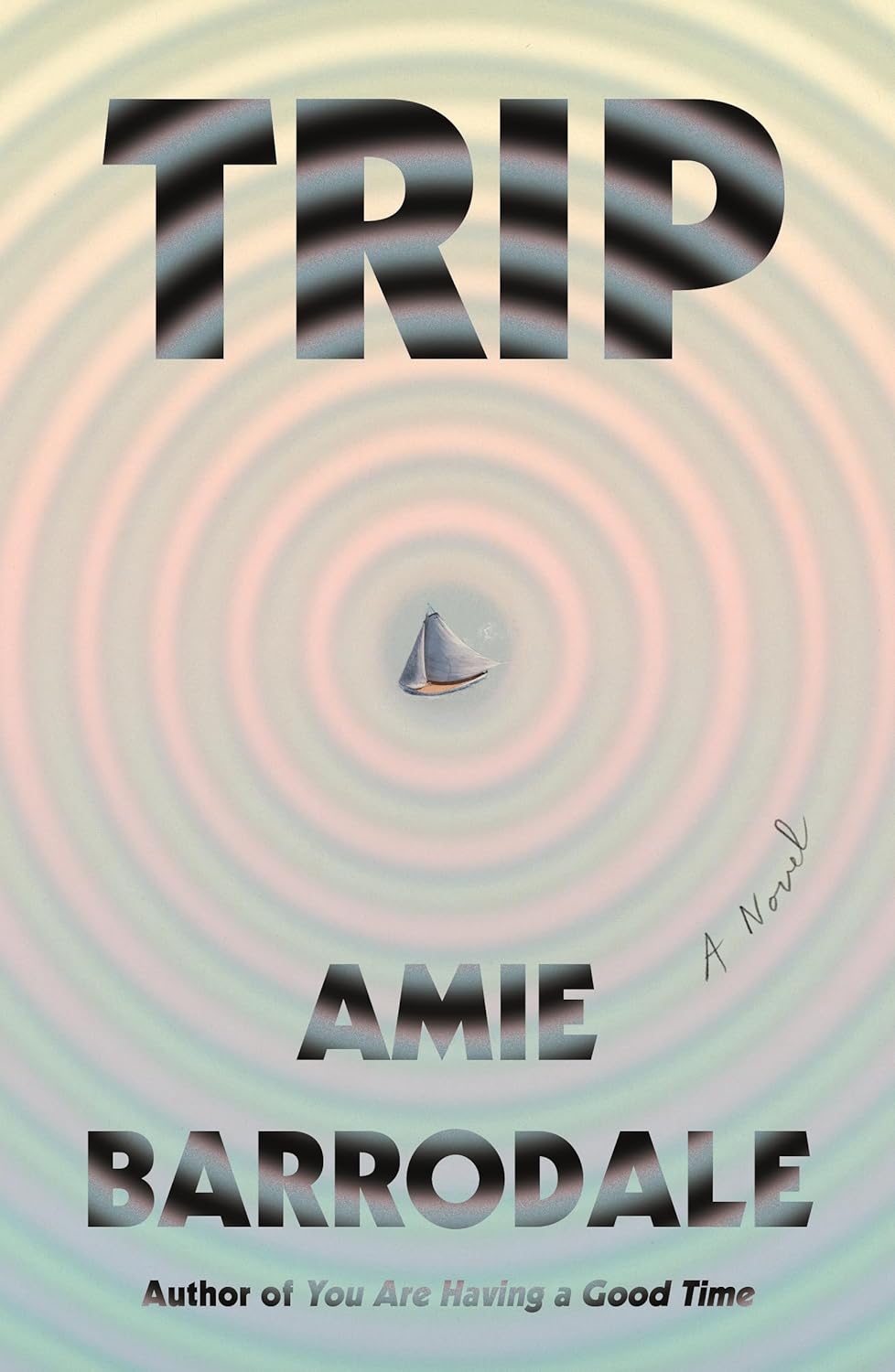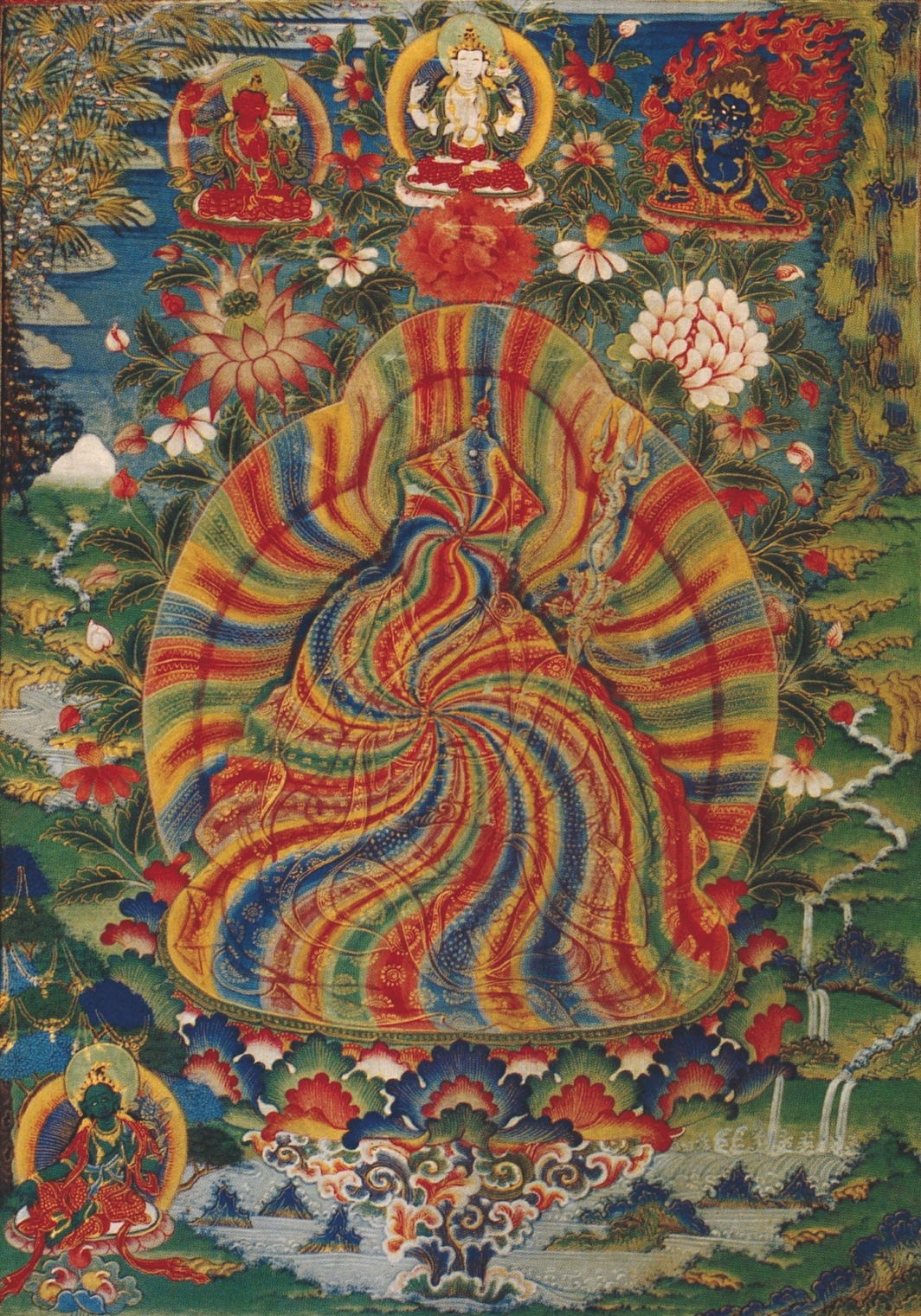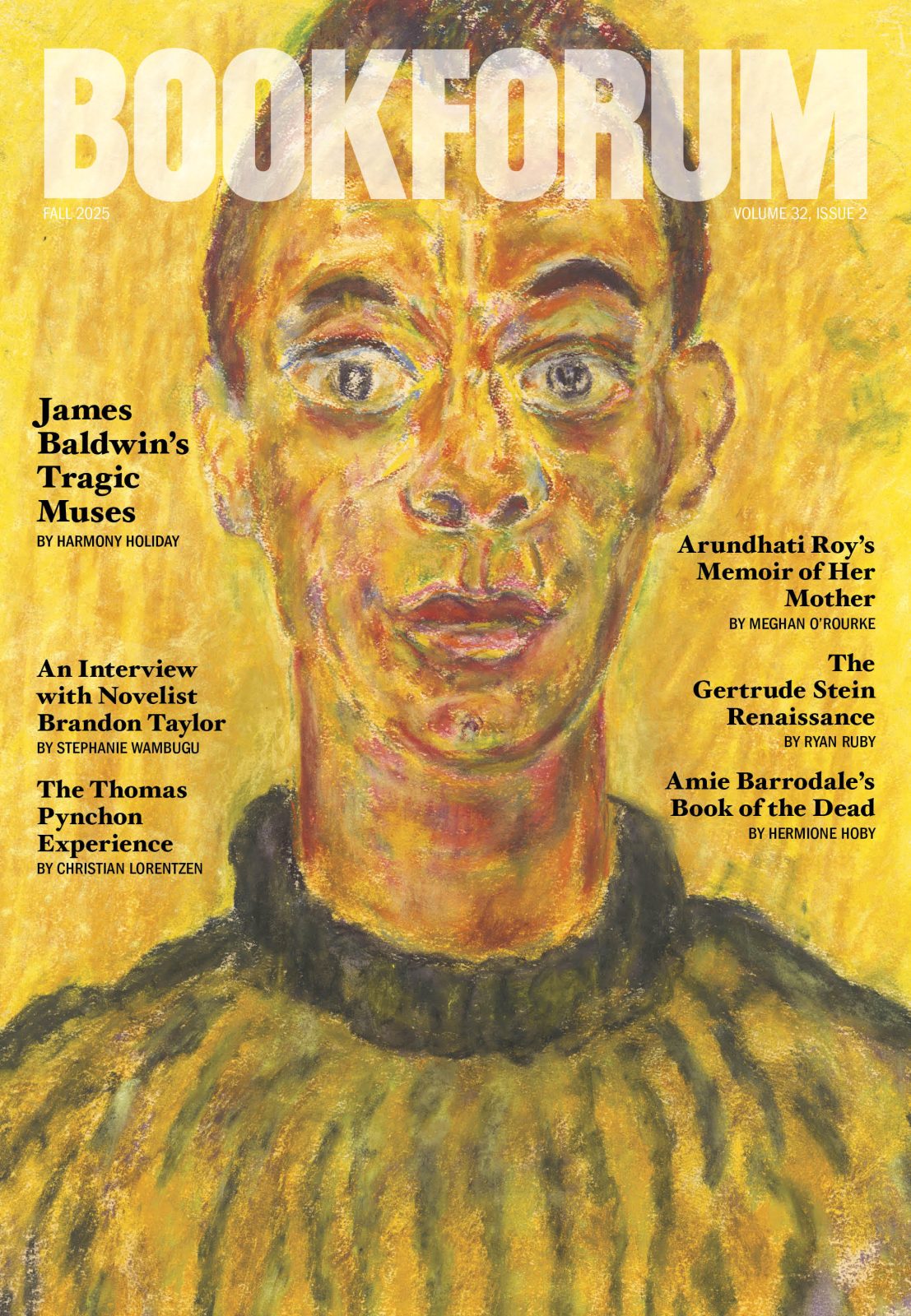
THOUGHT TO HAVE BEEN DICTATED a couple thousand years ago by an Indian guru named Padmasambhava, The Tibetan Book of the Dead was known as Bardo Th?dol or The Great Liberation Through Hearing in the Bardo until its first English language translation in 1927 by Walter Evans-Wentz, an anthropologist from New Jersey. Th?dol means “the wisdom that liberates,” and both original English titles give a clue to the book’s purpose. It’s a handbook of sorts, designed to be read aloud to the freshly deceased to help them navigate the six stages of the bardo—that in-between realm in which a soul roams after death. In this intermediate zone, things can go one of two ways. The soul has a chance to hold its nerve (as it were, what with being literally nerveless) in the face of dharmata (a tricky word to translate but one that denotes the unconditioned nature of reality rather than the world as perceived by the limited, egoic self). Seeing reality for what it is, it can be freed from the cycle of bodily death and rebirth known as samsara and achieve enlightenment. Or, more likely, the soul can freak out and be drawn back into fear, attachment, and reincarnation. The book’s repeated, no-nonsense injunctions to “listen carefully without distraction,” the sanguine reassurance of lines like “You are not alone in leaving this world, it happens to everyone, so do not feel desire and yearning for this life,” as well as straightforward explanations of supernatural goings-on (“When your mind and body separate, the dharmata will appear.
. . . Do not be afraid of it, do not be bewildered”) are all designed to bring about the former—that is to say, permanent karmic liberation from living physical form. In the West, the book has become more likely to be read by spiritual wanderers in this mortal realm than overheard by those in the postmortem soup—a funerary text that, as the Tibetan scholar Francesca Fremantle insists, “can show us how to live.” Nonetheless, death is the main event, and there’s no coy withholding of spiritual truths as it lands.
To adopt a similar spirit of up-front full disclosure: Amie Barrodale’s funny, sad, heretical debut novel, Trip, which takes place in the non-place of the bardo, as well as in the tangibly real places of contemporary America and Nepal, is a magnificent and lovable work—both page-turning and coolly visionary. The novel follows twinned odysseys of mother and son, both of whom are at sea in the figurative sense, and one of whom ends up literally at sea. This is Trip, the high-functioning autistic fifteen-year-old son of Sandra and her tragicomically hopeless ex-husband Vic. Through an unforeseen series of events, Trip will find himself aboard a stolen sailboat with a logorrheic relapsing alcoholic called Anthony, somewhere off the coast of Florida, as a hurricane barrels down. Meanwhile, his mother must navigate the even stormier waters of the afterlife, what with being dead. Much like in The Tibetan Book of the Dead, mind-blowing events are depicted with disarming simplicity. Whether or not the work of Denis Johnson and Joy Williams has been important to the author (I’d guess it has), all three share a sensibility of deadpan supernaturalism, and Barrodale is worthy of inclusion in Johnson’s and William’s company. Happily, though, Trip also derives its success from something more conventional—it’s a rescue narrative propelled by one question: Will the kid be saved or not?
As the novel begins, Sandra—recently hired as a documentary-news producer for PBS—is about to fly to Nepal for a month to attend a conference titled Death and Dénouement (a gathering of academics, neurologists, and mystics), where she’ll produce her first segment in the new job. Vic, meanwhile, is faltering on their agreement that he’ll solo-parent while she’s gone. An emergency meeting with Trip’s therapist is called. Vic bursts into tears the moment the therapist arrives. Then, cravenly prefacing his announcement with “this isn’t easy” and “I don’t like saying this,” he tells Sandra: “I feel like I’m pushing myself beyond what is safe. I don’t think I’ll be safe, with myself, if you go.” So it is that, wrapped within a security blanket of sanctioned therapy-clichés, this middle-aged man threatens the mother of his child with suicide if she goes ahead with her planned work trip. Barrodale’s ear is well tuned to the absurdities of various American idioms, and some of the treats to come include genially satiric renderings of therapy-speak, AA-speak, academia-speak. Cathy the therapist proposes sending Trip to a facility for the summer. “We went back and forth for twenty minutes,” Sandra recounts, “with me saying I couldn’t stay, Vic saying he was a danger to himself, and Cathy saying the Center had horses.” A compromise is reached, which, as with most compromises, pleases no one—except perhaps clueless Cathy, whose idea it was. The boy will be dropped at the Center, Sandra will go ahead with her trip, and Vic will be exempt from parenting his son for the month. When Sandra, seized by “some imaginary feeling of being watched and evaluated that had come over me intermittently since becoming a mom,” tries to say goodbye to her son, he’s engrossed in his phone. She asks him what he’s doing:
“It’s this game where you go inside people’s bodies. You can help them.”
“What is it, like, The Walking Dead?”
“No, it’s not zombies. It’s like you’re a psychologist. You get to help someone. And you can chat with other people who are playing.”
A teenage boy playing on his phone is a banal and recognizable piece of contemporary life. But in this instance, it’s also a glimmer of the unearthly phantasmagoria to come. After all, another way of seeing Trip’s game is that it entails a single consciousness roaming a virtual realm, undertaking a kind of disembodied serial embodiment (“you go inside people’s bodies”), on a mission of assistance. Soon, his mother will be doing something very similar, although not via her phone, and it won’t be any kind of game.
Having arrived in Nepal, Sandra and a small troupe of conference participants hike to a nearby cave. Near its entrance they come upon two sadhus—holy mendicants. In Sandra’s (or Barrodale’s) shrewd and unshowy way, Sandra notices that “one was naked, with broad horizontal strokes of white ash smudged across his forehead and a large enamel pin in his topknot. Something in his manner seemed to ask what impression he made.” The other “wore a T-shirt and a sarong printed with marijuana leaves. His outfit was not so good, but his gaze showed indifference to our thoughts, and that made him the more formidable of the two.” Sometimes, reading Barrodale is like hearing a tuning fork—or a prayer bell—struck. When hit with the right words, a discrete truth about contemporary human life emits a resonant musical tone.

Sandra follows a conference participant named Donald into a series of holy underground caves, the second of which—a natural wonder of a crystal-lined grotto, like the inside of a giant geode—can only be accessed by commando-crawling through a narrow aperture. After Sandra gets stuck in this claustrophobic, terrifying in-between—a foreshadowing mini bardo—the scene unfolds with both atavistic horror and the comedy of the mundane. Several people attempt to pull Sandra out backward, by her feet and against her will. She repeatedly asks this succession of strangers to not touch her feet. Eventually, full-bladdered and with no other option but to pee in place, she marvels: “I wouldn’t have thought I could still feel embarrassed in this situation.”
Our heroine dies, but not in the cave. Instead, back in her hotel room, post-rescue, she simply, bathetically, slips in the bathroom. The restraint of a prose style so firmly battened against sentimentality allows rare instances of tender emotion to be thrown into relief. As Sandra’s life is ending, or rather as “all the complicated ideas that had been Sandra seemed to be drifting further and further away, becoming slightly ridiculous,” she wonders: “All the time I had spent justifying myself. Wouldn’t it have been easier to have been gentle?”
From this moment on, the laws of conventional physics fall away for Sandra, and with them, the constraints of the realist novel for Barrodale. Even so, one of Trip’s main achievements is how credible and coherent all its outlandishness feels. Much like a sadhu in a T-shirt, the book does not ask you what impression it makes. It simply wears its convictions lightly, with dignity plus a dash of nonchalance. Sandra, now an unlimited consciousness catapulted into the bardo, can become something almost omniscient in her author’s hands as she travels through time and space, while struggling to realize that she’s deceased. At one point, while awaiting her next incarnation, she finds herself in what seems to be a sharing circle:
A desquamated head, perched on a pile of reproductive organs, cleared her throat. “I can go if no one else is ready to go. Do I need to give the history, or?”
“No, I don’t think so. For now, let’s just try to dump our brains!”
“Right. Okay. So, what? I guess I’ll just say it. I think of Harvey Weinstein when I masturbate.”
The creatures howled.
“Why?! Why?!” a pretty dog’s digestive tract shouted.
“I know,” the desquamated head said. “I’ll tell you what, though, he definitely has the lowdown. He knew what he was doing, as far as that goes. In that particular area. I mean, he was a great fuck. I guess I’m the only woman who slept with him because she wanted to.”
True novelistic heresy isn’t killing off your main character on page 52 of 283. True heresy, surely, is having a character say Harvey Weinstein is a great fuck. To put that in a work of literary fiction takes valor—or indeed balls. (The fact that the “character,” such as she apparationally is, speaks from atop a pile of them is pretty apropos.)
While Sandra’s consciousness hurtles through future, present, and past (the past granting us flashes of backstory around Trip’s diagnosis and his trying experience of school), her son has strayed from the Center’s grounds. You don’t blame him. The poor kid has lasted two days, time enough for his roommate to “shit his pants on purpose when the registered behavior technician on duty took his guitar” and threaten to eat a battery. What with mealtimes being “hectic,” Trip doesn’t think anyone will notice his absence “until medications at two.”
Tearful and in great pain after having sustained a lizard bite, Trip is wandering along the freeway when his good Samaritan arrives in a white Toyota Camry. This is the fundamentally kind if hilariously oblivious and substance-abusing Anthony (“Like the saint,” he reassures Trip, “Saint Anthony”) —a middle-aged guy undergoing a divorce who assumes that this mute young hitchhiker has escaped a rehab center and is, like him, a wayward “friend of Bill.” Part of the comic energy of this pair, the straight man teenager and the antic clown, is that Anthony is never disabused of this notion. Trip isn’t “nonverbal” in the diagnostic sense, but nor he is he particularly verbal, except when it comes to his passion, astronomy. In these circumstances, Anthony does a lot of erroneous filling in of gaps.
It’s in Anthony the ungovernable addict that the imprint of Denis Johnson is most obvious. As demonstrated in her 2016 short story collection, You Are Having a Good Time, Barrodale, much like Johnson, observes her florid fuckups with a gaze that sees everything and judges nothing. Trip’s most obvious precedent, however, is George Saunders’s Lincoln in the Bardo, also a debut novel, albeit one that followed four beloved short story collections. In Saunders’s afterlife, various spirits join Willie, Lincoln’s eleven-year-old son who has died from typhoid fever, while his father grieves in the crypt. This is how Saunders writes about his bardo: “Only then (nearly out the door, so to speak) did I realize how unspeakably beautiful all of this was, how precisely engineered for our pleasure, and saw that I was on the brink of squandering a wondrous gift, the gift of being allowed, every day, to wander this vast sensual paradise, this grand marketplace lovingly stocked with every sublime thing.”
If Saunders is the huggable older uncle who can’t help but eagerly proffer such warm gifts of consolation, Barrodale’s sensibility is that of cool young aunt who lets you figure it out for yourself while she watches from a distance—possibly from behind sunglasses. Never once losing control, she writes with a tonal blankness that accommodates that sweet/sore spot where pathos and comedy meet: “I am using,” the being formerly known as Sandra reports from the afterlife, “the proper words for all the things that were going on, because it’s the only way I can describe them, but actually, by this time, I didn’t really know the words much anymore.” At one point, she finds herself in her bedroom listening to Donald, her conference colleague, talk about the peaceful deities. “He was telling me to avoid the smoky light that was familiar to me and to go toward the dazzling bright light.” It seems that Donald is dutifully reciting The Tibetan Book of the Dead, or some version of it, to his departed new friend. But Sandra can’t turn toward the light: she has a mission. Her boy is in trouble. “I did not have limitless time to help Trip,” she observes, becoming aware that soon, “I would move on to another form.” To reach him and help him, her consciousness inhabits (“possesses”) various bodies, including Donald’s—as Donald himself will attempt to explain to Vic later. Then again, what is “later”? Reaching the final pages of this consciousness-expanding journey, having been tumbled through a welter of scenes of past and future, concepts like “now” and “then” no longer seem to hold much weight. It takes an audacious novel to remind you that not only can reading fiction feel like a psychedelic experience, but that you don’t even have to be dead to roam in a bardo of mutual creation. That volatile, metaphysical space between an author’s mind and a reader’s is there for the experiencing on this earthly plane.
But Barrodale’s bardo is more than just a vibey trip. It’s also a place of moral awakening. When Hamlet says, “There is nothing either good or bad, but thinking makes it so,” he is essentially restating The Tibetan Book of the Dead’s central abstraction, one that Carl Jung in his 1935 commentary calls “the antinomian character of all metaphysical assertions.” Jung’s use of “antinomian” here is both etymological and elastic; we are not dealing with Kantian-style antinomies of thesis and antithesis, nor the stingy constraint of mere paradox, but instead, as Jung enthuses, “a magnificently affirmative ‘both-and.’” The psyche, he insists, not only supplies “the condition of all metaphysical reality” but also is that reality. How we think about the world, in other words, is the world. In The Tibetan Book of the Dead, this fundamental position comes through in lines such as this: “He who is called Glorious Great Buddha-Heruka will emerge from within your own brain and appear before you actually and clearly.” The first adverb is doing a lot of work in the sentence. “Actually” as in, realistically, in reality—as in, thinking makes it so. (There’s a trippiness in recognizing that Padmasambhava and twentieth-century psychology, not to mention a minority of contemporary neuroscientists, are all grooving on the same idea across time and space, in what some might call the astral plane and others, the dissident neuroscientists, would identify as quantum physics.)
But an inadequate, albeit sensical reading of “nothing good or bad, but thinking makes it so” could also take it as some shrugging indication of life’s fundamental amorality—if it’s all subjective, if it’s all just in your mind, who cares? It threatens a nullifying relativism. Barrodale does not let either her reader or her main character off the hook with anything as voiding as that. Instead, Trip confronts a problem Buddhism makes explicit: how to attain non-attachment, that serene, even magnificent state of “both-and,” while remaining morally and emotionally attached to the objects of our love. A mother might partially accept her own demise, but she, like us, will have a harder time accepting the possible death of her teenage boy. Sandra does not escape samsara (toward the end of the novel she glimpses her future parents), but she does experience an enlightenment of sorts. It comes in the most moving line of the novel. It’s as simple as this: “I understood that nothing had ever been wrong with Trip.” There is indeed nothing wrong with a boy who has autism. To know as much is a beautiful form of acceptance. But surely there is something fundamentally wrong, as in spiritually unacceptable, about the death of a very young person. Like his mother, we care whether Trip lives or dies. For the unenlightened among us, it’s easier to magnificently affirm Jung’s “magnificently affirmative both-and” in the realm of fiction, rather than in life itself. This, truly, is where thinking makes it so. Something unacceptable—say, an indecisive prince who ends up slaughtering everyone around him—becomes terrible as well as beautiful, deplorable as well as understandable.
The kid lives, by the way—beautiful. And he’s motherless at fifteen—terrible. In Barrodale’s expert telling the two narrative strands, Trip’s survival, Sandra’s death, can’t be extricated.
Hermione Hoby is the author of the novels Neon in Daylight (Catapult, 2018) and Virtue (Riverhead, 2021).
